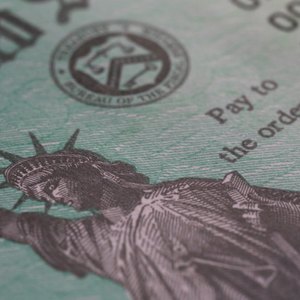
Most of the time, the yields on Treasury bills and bank certificates of deposit of the same maturity are similar. Although these two types of secure savings products look a lot alike to investors, the way they function and how rates are set are very different. If you're looking for a safe place to park some cash, first check current T-bill rates and then see if you can find a CD paying a better yield.
Tips
Both CDs and Treasury Bills typically feature similar interest yields. However, there may be some differences at times due to the fact that treasury bill rates are established by the US Treasury and CD rates are set by banks.
Treasury Bill Yields
Treasury bills are marketable securities, where prices and yields are set by supply and demand. The U.S. Treasury sells new T-bills on a weekly basis using an auction process to set the rates on each new issue. The yield you earn on a Treasury bill is the rate set by the Treasury securities markets and bid by the large financial institutions that participate in the T-bill auctions. The rate for Treasury bills is often viewed as the benchmark rate for short-term investment interest rates.
Understanding CD Rates
Each bank sets the rates on the certificates of deposit it offers to customers. A bank sells CDs to gather deposits to increase the deposit base that allows the bank to issue more loans. If a bank wants to gather more deposits, it may offer higher CD rates to attract customers. As a result, certificate of deposit rates vary from bank to bank. Shopping around can help you find the best CD rate, either by calling your local banks or reviewing quotes on the Internet CD comparison websites. If you bank with a local bank, it may even be open to giving you a higher rate to keep the money you have on deposit. Most of the time, a CD yield should be higher than the rate you could earn on a Treasury bill.
Treasury Bill Features
Treasury bills have terms of 13, 26 and 52 weeks when issued. You can also buy T-bills on the secondary market with any term up to the 52-week maximum. Treasury bills are sold at a discount to the face value, with the discount acting as the interest to be earned. You may see both a discount and investment yield quoted for a bill -- and the investment yield is what you actually earn on the T-bill. Treasury security interest is exempt from state income tax, giving T-bills a small advantage over fully taxable bank deposit interest. T-bill rates are published by the Treasury daily.
Exploring CD Features
The length of term on a CD can range from 30 days out to 5 years or longer. A bank typically offers 30-day, 6-month and one-year CDs that compete directly with Treasury bills. Longerthan-one-year-term CDs usually pay a higher rate than the best T-bill yield, but your money will be tied up for a longer period of time. Federal Deposit Insurance Corporation insurance gives a government guarantee to bank deposits up to $250,000. In contrast, a Treasury bill is a direct obligation, so for larger investments, Treasuries have a stronger government guarantee.
References
- New York Fed: Estimating Yields on Treasury Securities
- U.S. Treasury: Daily Treasury Bill Rates Data
- Internal Revenue Service. "Topic No. 403 Interest Received." Accessed Aug. 14, 2020.
- U.S. Department of the Treasury. "Treasury Bills: Tax Considerations." Accessed Aug. 14, 2020.
- U.S. Department of the Treasury. "Treasury Bills in Depth." Accessed Aug. 14, 2020.
- Internal Revenue Service. "Topic No. 409 Capital Gains and Losses." Accessed Aug. 14, 2020.
- U.S. Department of the Treasury. "Daily Treasury Yield Curves." Accessed Aug. 14, 2020.
- New York State. "2019 Instructions for Form IT-201," Page 57. Accessed Aug. 14, 2020.
Writer Bio
Tim Plaehn has been writing financial, investment and trading articles and blogs since 2007. His work has appeared online at Seeking Alpha, Marketwatch.com and various other websites. Plaehn has a bachelor's degree in mathematics from the U.S. Air Force Academy.

